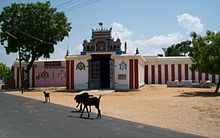This article has multiple issues. Please help improve it or discuss these issues on the talk page. (Learn how and when to remove these messages)
|
| Kulasekharapatnam Kulasekarapatnam, Kulasekarapattinam | |
|---|---|
| Town | |
  | |
| Coordinates: 8°24′0″N 78°3′0″E / 8.40000°N 78.05000°E / 8.40000; 78.05000 | |
| Country | |
| State | Tamil Nadu |
| District | Thoothukudi |
| Government | |
| • Body | Kulasekharapatnam Panchayat |
| Area | |
| • Total | 12.5 km (4.8 sq mi) |
| Population | |
| • Total | 12,010 |
| • Density | 960/km (2,500/sq mi) |
| Languages | |
| • Official | Tamil |
| Time zone | UTC+5:30 (IST) |
| PIN | 628206 |
| Telephone code | 4639 |
| Vehicle registration | TN 92 |
| Nearest city | Thoothukudi |
| Sex ratio | 1000:1177 ♂/♀ |
| Literacy | 85.91% |
| Lok Sabha constituency | Thoothukudi Formerly with Tiruchendur |
| Vidhan Sabha constituency | Tiruchendur |
| Civic agency | Kulasekharapatnam Panchayat Board |
| Climate | Humid (Köppen) |
| Website | www |
Kulasekharapatnam is a town in the Thoothukudi district of Tamil Nadu, India. The town is one of several ports on the Coromandel Coast, including Kaveripumpattinam (Poompuhar) and Arikamedu (near Pondicherry).
Since at least the 1st century CE, the town was recorded as a port alongside other ancient cities like Kollam, Cheran, and Pandyan. Kollam served the Pandya polity on the west coast while Kulasekharapatnam served them on the east coast connecting it to Ceylon and the pearl fisheries in the Gulf of Mannar facing the Tirunelveli Coast. Together with its sister ports, it ranks among the ancient costal settlements of Peninsular India, with Kodungallur and Barugachha (Broach) in Gujarat serving the west coast. More recently Kulasekharapatnam's significance diminished with the rise of Tuticorin in the Colonial Era.
The name Kulasekharapatnam is derived from the Pandyan ruler Maravarman Kulasekara Pandyan I. Kulasekharapatnam is occasionally referred to in Marco Polo's travel diaries dating to 1250.
Kulasekharapatnam has had Muslim settlements since ancient times.
The famous Mutharamman Temple, which is over 300 years old, is located in this place. Also, at the north of this village, an ancient marvelous Temple of Dharmasamvardhini is situated. Kulasekharapatnam is world famous for the Dashra ( Dussehra ) Festival.
A sugar factory was running very successfully till the end of the British rule. Since British rule, Kulasekharapatnam has had a customs office. British Railway Line was established and it was called Kulasekharapatnam Light Railway and the stations were Kulasekharapatnam Central, Kulasekharapatnam Port, and KPM Sugar Factory in 1933.
ISRO has announced that a new space launch pad will be set up at Kulasekharapatnam.
Rowthers & Marakkars settlement
In Kulasekharapatnam, during the reign of the Pandyas, the city was also known as the Rowthers Palayam, a section of Muslim that has military cavalry, traditional people, and horse traders. Kulasekharapatnam was also an important trade center even before the arrival of Islam. Now Kulasekarapatnam has Muslim Population known as Marakkar or Marakkayars they were doing trade with Ships, they had come from Kerala, it is said Kunjali Marakkar's family members coming from Kerala. In Kulsekarapatnam until 1965, the small ship Dhoni operated there. If a town was a port, it must have had a lighthouse. Kulasekharapatnam even now has a lighthouse near Manapad. Since the 8th century CE, this city has been inhabited by Hindus.

Origin of Marakkars
Maraicar or Maraicayar, Marakayar, Maraicar are distinctive Tamil and Malayalam-speaking Muslim peoples of the states of Tamil Nadu and Kerala in India. The name Marakkar is different from Marakkayar (Marikkar & Maricar are other spellings used in history books). According to many other historians, Moppila or Moplah is Maha Pillai (great son) and Marakkar means (Marakkalam is a wooden boat) ‘boatmen’. Thurston in his Tribes of South India, states the following - The word Marakkar is usually derived from the Tamil 'marakalam', a boat.
Was it also a titular name for seaborne traders? KVK Iyer clarifies in his history of Kerala that Marakkar was a prized title given by the Zamorin of Calicut. Derived from Marakka Rayar, it signifies the captain of a ship Rayar (Captain) of Marakkalam (ship).
Traditionally, the Maricars engaged in mercantile commerce. They can be found along coastal areas of the states of Kerala and Tamil Nadu in India.
The Maraicars can be found in coastal areas of South India, including Kerala and Tamil Nadu.
Those who settled in coastal regions of India Tamil Nadu and Kerala are called marakala rayars, from marakalam meaning "wooden boat" and rayar, meaning "king" in the Tamil language. The captains of the ships are called malimars, which come from the Tamil words malumi, meaning "captain," and yar; and the ship's crew members are called sherangs. marakala community or mogera alias mogaveera community is the very powerfull fisherman community in coastal karnataka. marakala's are fishermans. his kula kasubu is fishing in rivers and sea. Barkoor bennekudru kulamahasthry temple, uchila mahalaxmi temple, bagvadi mahishamardini temples are major mogaveera kuladevi temples in coastal karnataka
References
- K. A. Nilakanta Sastri, History of South India, 2nd ed., Oxford University Press, 1958
- "Picnic on the beach". The Hindu. Chennai, India. 15 October 2005. Archived from the original on 29 October 2005.
- "New launch pad in Tamil Nadu to help Isro". Times of India. Retrieved 28 June 2020.
- ^ Maddy. "Search Results Web results The Marakkar's and their origins".
External links
- https://web.archive.org/web/20111015080841/http://indianmuslims.in/kunjali-marakkar/
- Kudi Maraikayar of eastern Sri Lanka